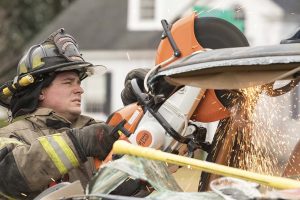
By DON FLETCHER
News Staff Writer
Atmore firefighters are continuously training to stay on top of the requirements of their job. But they don’t often get to carry out a training exercise like the one a small group of them tackled December 19.
Capt. Zack Stewart and firefighters A.J. Beachy, Wayne Kelly and Jesse Boone got to sharpen their skills on several extrication tools by cutting apart a vehicle — one donated by Kelly — in the parking lot of AFD’s Pensacola Avenue station.
Head Captain Daniel “Buddy” Love, AFD’s training officer, set up the exercise.
“We try to cut up at least one car a year,” explained Fire Chief Ron Peebles. “David’s Paint & Body donated the car from the ones that were unclaimed on their lot. He usually brings them up here and we cut them up out in that field (along Ridgeley Street), but the field is too wet right now, so we did it over at Station 4.”
Firefighters must undergo 16 hours each month in training on structural firefighting, and much of their other training is of the textbook-classroom variety. The rare chance to practice using the extrication tools, which counts toward their annual requirement for continuing education, is a welcome diversion.
“They love to cut up a car, bust out all the windows, that kind of stuff,” laughed Peebles. “But it’s important that they know how to use Jaws of Life and the other extrication tools because we get called out every time somebody’s trapped inside a wrecked car.”
The fire chief said he and his men would like to practice such maneuvers more often, but finding a vehicle to practice on is not all that easy.
“We’d love to do two or three cars a year,” Peebles said. “But it’s according to how many cars we get donated to us.”
He said city firefighters are quite often training, even when it doesn’t look like they are.
“A lot of times, when you see us in the stores, we’re doing training, or we’re doing fire inspections or helping work on fire planning,” he said. “Of course, sometimes we just need to go to the store to get some groceries or supplies, so you just never know.”
